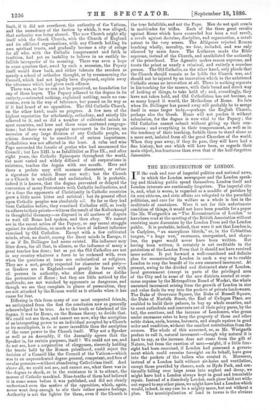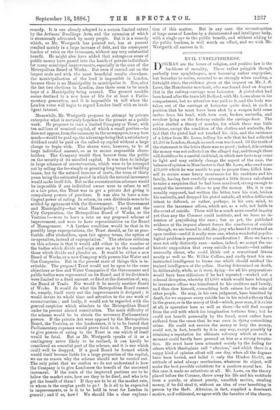THE RECONSTRUCTION OF LONDON.
IN the rush and roar of imperial politics and national news, in which the London newspapers and the London speak- ing and thinking public spend themselves, London itself and
London interests are continually forgotten. The imperial city is, and, what is worse, is regarded as a muddle of parishes by its own citizens, and civic affairs are relegated to the parochial politician, and care for its welfare as a whole is lost in the multitude of caretakers. Were it not for this unfortunate condition of things, it would not have been possible for a paper like Mr. Westgarth's on "The Reconstruction of London' to have been read at the meeting of the British Association without receiving more discussion by the London Press and the London public. It is probable, indeed, that were it not that London is, in Carlylese, "an amorphous blotch," or, in the Cobbettian tongue, "a huge wen," enormous, unorganised, and shape-
less, the paper would never have been written. But having been written, it certainly is not creditable to the patriotism of the London Press that it should not have received more notice. It put forward a well-considered and definite plan for reconstructing London in such a way as to enable London to reap the benefit of its own unearned increment. At present, owing to the divided and distracted state of London, local government (except in parts of the privileged area of the City and in some of the new districts erected at enor- mous expense by the Metropolitan Board of Works), the whole unearned increment arising from the growth of London in size and value finds its way into the pockets of private landowners. The Duke of Grosvenor Square, the Duke of Russell Square, the Duke of Norfolk Street, the Earl of Cadogan Place, are enabled to build their palaces, to buy up whole counties, and to erect cathedrals and convents out of their privy purse, by the toil, the erections, and the increase of Londoners, who groan under enormous rates to keep the property of these and other noble dukes, earls, barons, baronets, and simple squires in good order and condition, without the smallest contribution from the owners. The whole of this unearned, or, as Mr. Westgarth prefers to call it, natural increment—though why natural it is hard to say, as the increase does not come from the gift of Nature, but from the exertion of man—might, if a little fore- sight had been exercised, if London had possessed a govern- ment which could exercise foresight on its behalf, have gone into the pockets of the toilers who created it. Moreover, instead of a London built without air-holes and ventilation, except those provided by chance, such as Hyde Park, and con- tinually falling over large areas into neglect and decay, we might have had a London always kept in good and tenantable repair. Instead of a disorderly London, each piece laid out with- out regard to any other piece, we might have had a London which would, indeed, in any case be a mighty maze, but not without a plan. The municipalisation of land in towns is the obvious
remedy. It is one already adopted to a certain limited extent by the Artisans' Dwellings Acts, and the extension of which is strenuously advocated by many people. But it is a remedy which, as Mr. Westgarth has pointed out, has at present resulted mainly in a large increase of debt, and the consequent burden of rates on the townsmen, without any very substantial benefit. He might also have added that outrageous sums of public money have passed into the hands of private individuals for many municipal improvements, especially in the area of the Metropolitan Board of Works. But even if carried out on the largest scale and with the most beneficial results elsewhere, the municipalisation of the land is impossible in London, because there is no Municipality to municipalise it. Nor, after the last two elections in London, does there seem to be much hope of a Municipality being created. The present muddle seems destined to a new lease of life for at least a Parlia- mentary generation, and it is impossible to tell when the London voter will begin to regard London itself with an intel- ligent interest.
Meanwhile, Mr. Westgarth proposes to attempt by private enterprise what is certainly hopeless for the present as a public work. He proposes to start a limited Company or Trust, with ten millions of nominal capital, of which a small portion—he does not appear, from the summary in the newspapers, to say how much—would be paid up, the advantage being that a satisfactory dividend could be paid on the called-up capital without a large charge to begin with. The shares were, however, to be of large individual amount, so as to secure responsible share- holders. The Company would then borrow from the public on the security of its uncalled capital. It was then to indulge in large schemes of reconstruction, which were to be recouped not by selling the fee-simple or granting long terms for building leases, but by the natural increase of rents, the term of thirty years being the estimated petiod in which the natural increment would make itself felt. But as the reconstruction schemes would be impossible if any individual owner were to refuse to sell at a fair price, the Trust was to get a private Act giving it compulsory powers of purchase. It was also to have a con- tingent power of rating. In return, its own dividends were to be settled by agreement with the Government. The Government and Municipality—but what Municipality ? surely not the City Corporation, the Metropolitan Board of Works, or the Vestries ?—were to have a veto on any proposed scheme of improvement, and were to have representatives on the Board of Management. " A further condition would be that in its possibly large expropriations, the Trust should, as far as prac- ticable, offer siteholders, upon fair agency terms, the option of co-operation, instead of expropriation." The obvious criticism on this scheme is that it would add either to the number of the bodies which divide and reign over us, or to the number of those which divide and plunder us. It would be either a new Board of Works, or a new Company with powers like Water and Gas Companies. But in the present state of things this is in- evitable. The proposed Trust would not be open to the same objections as Gas and Water Companies if the Government and public bodies were represented on its Board, and if its dividends were limited to a fixed amount, or fixed at the discretion of, say, the Board of Trade. Nor would it be merely another Board of Works. It would do what the Metropolitan Board cannot do, namely, itself carry out the improvements it designed ; it would devote its whole time and attention to the one work of reconstruction ; and lastly, it would not be regarded with the general suspicion which attaches to the Metropolitan Board under its present absurd constitution. The main difficulty of the scheme would be to obtain the necessary Parliamentary powers. If the private Act were opposed by the Metropolitan Board, the Vestries, or the landowners, it is to be feared that Parliamentary expenses would prove fatal to it. The proposal to give powers of rating to the Trust is one which of itself would be fatal. But as Mr. Westgarth speaks of it as a contingency never likely to be realised, it can hardly be considered an essential part of the scheme, and it is one which could well be dropped. If a good Board be formed which would itself become liable for a large proportion of the capital, we see no reason why the scheme should not be carried out. The only point that we confess ‘93 do not understand is how the Company is to give Londoners the benefit of the unearned increment. If the rents of the improved portions are to be below the market rate, how are they to be fixed, and who is to get the benefit of them ? If they are to be at the market rate, to whom is the surplus profit to go ? Is it all to be expended in improvements, or is it to be held in trust for London in general ; and if so, how? We should like a clear explana-
tion of this matter. But in any case, the reconstruction of large areas of London by a disinterested and intelligent body, with a single eye to the public benefit, and without adding to the public burdens, is well worth an effort, and we wish Mr. Westgarth all success in it.



































 Previous page
Previous page